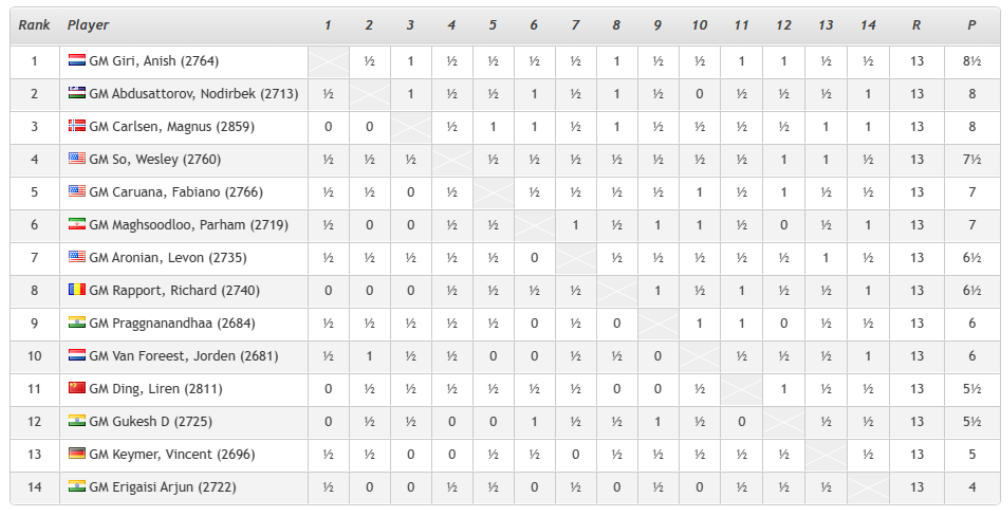Giri the Great

The elite tournament at Wijk aan Zee, Holland, which finished earlier this week, has resulted in victory for Anish Giri, the former Russian, now Dutch, Grandmaster. GM Giri needs some introduction to a global audience, but he is a potential world champion, indeed a player who has already inflicted several defeats on Magnus Carlsen — including one at Wijk.
The strength of the Dutch tournament can be gauged from the lowly placing of Ding Liren, hitherto rated world number two, who narrowly avoided last place. This coming spring Ding will challenge for the FIDÉ “world championship” in Kazakhstan.
Tata Steel Master Tournament, Wijk-aan Zee, January 14 – 29 (2023)

In the above cross-table, every competitor plays every other competitor once, and 1 signifies a win, ½ a draw and 0 a loss.
Giri’s career has been peripatetic, to put it mildly According to the authoritative Chessgames.com website, Giri was born (28 June 1994) in St Petersburg, Russia, to Sanjay Giri, a research scientist, and Olga Giri, a civil engineer. His father is Nepalese and his mother Russian. Anish is a typical Hindu name used in parts of the countries of India and Nepal. He started playing chess when he was seven years old. Seven years later he was already a Grandmaster.
How things change. At age 14 I was a pupil at Dulwich College and at that time, winning the junior county championship was considered a huge success. It took me a further 14 years to gain the Grandmaster title, and in the class of 1976 I was by no means the oldest to attain grandmasterly apotheosis. Life has speeded up since then. The world’s youngest Grandmaster, now 14 years old, is Abhimanyu Mishra, an American who qualified for the title in 2021 when only 12 years, 4 months and 25 days old.
Giri won the Russian U12 championship in 2006 and his FM (FIDÉ Master) title in 2008. In the following year, he became the youngest Grandmaster in the world at that time at the age of 14 years 7 months and 2 days. He gained the GM (Grandmaster title) without acquiring an IM (International Master) title first. Very few people have skipped this intermediate stage, one notable exception being Mikhail Tal, whose storming of the Soviet Championship was deemed sufficient accolade to reach Grandmasterhood in one spectacular leap.
Soon after he won his GM title, Giri placed clear first with 6/8 at the Dutch Championship (2009).
After spending a few years in Japan, where he became a member of the Japanese Chess Association and the Sapporo Chess Club, Giri and his parents, plus his sisters, Natasha and Ayusha, settled in the Netherlands. Fortunately for the world of chess, Giri had not been seduced during his sojourn in Japan by those alternative oriental Mind Sports, Go and Shogi.
Giri’s style of play was originally cautious, with a very high percentage of drawn games. Latterly he has become considerably more pro-active, and he has consistently demonstrated a strong work ethic in his continuous participation in tournaments, having played in almost every rating period since he first registered on FIDE’s rating system in 2005. Giri was first coached by Vladimir Chuchelov, but is now being seconded by Vladimir Tukmakov, whom I first played in the junior world chess championship of 1965.
This week’s games (see below) are the dramatic last round twists and turns from Wijk aan Zee, which catapulted Giri into top spot, ahead of the young Uzbek Nodirbek Abdusattorov. Giri’s opponent, the reckless Hungarian Grandmaster, Richard Rapport, chose an opening variation of the Sicilian which, to quote Capablanca, left Black’s structure “full of holes.” For a while Giri appeared to be maintaining an iron grip, based on his control of the d5 square.
Then, as the game approached the first time control, Giri went berserk, with an unexpected advance of his king side pawns. Objectively this should have blown his advantage, but Rapport panicked with the suicidal …Kg6 (any other move would have equalised), whereupon Giri inserted his rapier, winning the game and the tournament, without losing a single encounter.
Abdusattorov, meanwhile, needing only a draw with White to win the tournament, had built up an impressive advantage against the erratic Van Foreest, but allowed his momentum to dissipate and ultimately suffered his first loss, in an event which he had seemingly been set to dominate. Both Giri and Abdusattorov defeated Carlsen, whose renunciation of the world title appears to have done him no favours. In my opinion, being world champion lends a charismatic aura which, in some way, intimidates the opposition. By renouncing the title, as Shakespeare put it in Othello, Carlsen threw away a “Pearl, richer than all his tribe”.
Raymond Keene’s latest book “Fifty Shades of Ray: Chess in the year of the Coronavirus”, containing some of his best pieces from TheArticle, is now available from Blackwell’s. His 206th book, Chess in the Year of the King, with a foreword by The Article contributor Patrick Heren, and written in collaboration with former Reuters chess correspondent, Adam Black, is in preparation. It will be published later this year.
A Message from TheArticle
We are the only publication that’s committed to covering every angle. We have an important contribution to make, one that’s needed now more than ever, and we need your help to continue publishing throughout these hard economic times. So please, make a donation.





